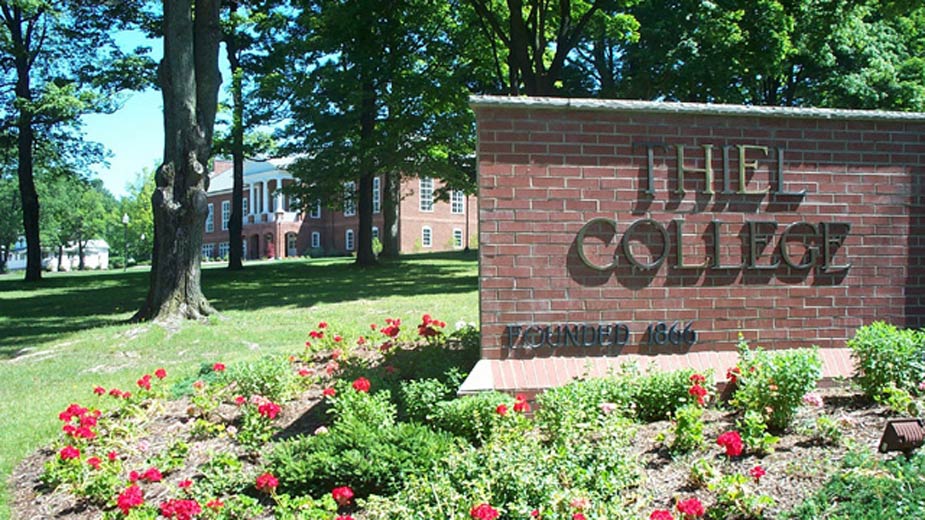HERMITAGE, Pa. – The MBA program at Thiel College recently teamed up with the Hermitage Municipal Authorities Wastewater Facility, which operates with energy produced by an innovative food-to-methane gas to electricity process.
Superintendent Thomas Darby, the plant manager, says most of the Thiel students came into their capstone projects without much knowledge about operating a wastewater treatment plant or one with the capabilities of the Hermitage plant. But they had some insightful ideas.
Students looked at how to better market the plant to prospective food producers, including whether it made sense to work directly with local residents. Much of the food processed at the plant comes through brokers who negotiate with Darby.
Although the plant can process tons of unused food products, most of it comes from the manufacturing end, including from a local dairy. The students studied the feasibility of collecting the food waste by directly picking it up from the residents of Hermitage, met with focus groups and completed community surveys.
Steven Kandray, the assistant professor working with the Thiel MBA students, says over seven weeks, the students completed a marketing project by collecting data, presented interesting results and gained experience for their resumes.
“I think it was a very good hands-on learning experience,” Kandray says. “Something they could go to employers with that I think would be impressive.”
The MBA students also looked at similar food waste processing plants, although Darby says not many places are doing it. The Hermitage plant is the only one in Pennsylvania and one of fewer than 15 in the country, he says.
Another group of students looked at how the plant will continue to operate should Darby decide to retire one day.
Anthony Kos, chairman of the Thiel MBA program, says those students were studying talent optimization, looking at how to replace a world-recognized authority in the operation of such a plant like Darby, who not only runs the plant, but speaks on the process used worldwide.
While not every municipal sewage service is capable of generating revenue, Darby is proud of what the Hermitage plant has been able to accomplish working to be energy neutral. He tries to change the perception that municipal sewer plants are dark and dank places that should be placed somewhere no one can see it.
“That was what I tried to show to the students. Even in a municipal arena, there are opportunities to increase revenue, to make money and to not put that burden on the taxpayers.”
Hermitage City Manager Gary Hinkson says he looks at the food waste to electricity initiative as a “win, win, win program.” It gives the food service industry an economical way to dispose of products. It helps the environment and it is a win for the city by reducing operation costs.
With more than 200 miles of sewer lines, the wastewater plant and 18 pump stations to maintain, Hermitage has not had to increase sewer rates since 2013.
Although that might not last forever, Darby says for the moment, the food-to-electricity portion of the plant is subsidizing the sewer system of the town.
The biosolids produced through the process also are usable by farmers growing grass-type crops. Darby says they fill up a semitrailer and farmers pick it up and haul it back to the farm.
An evolving process, the Hermitage plant staff is studying the different food products going through the plant and trying to be able to predict exactly how much energy each will produce.
Darby has been approached by many seeking information about the process, including a company considering just processing food products to make the slurry and then sell it to municipal wastewater plants.
Not only can the biogas produced through the plant be used to make electricity, it can also be bottled to power natural gas vehicles. The gas can be converted and injected directly into natural gas lines.
“There’s a lot of opportunities and I wish I were 30 years younger doing this, because I feel like there is so much more that’s going to come about. We could do so much more and I hope they continue,” Darby says.
PARTNERSHIP WITH THIEL
Darby credits Jeff Meier, executive director of the eCenter@LindenPointe, for making the connection that brought Kos and the MBA students to the plant. The capstone projects allow students to gain real exposure to business and industry, while providing companies with fresh ideas to address their challenges.
It made sense to Kos for the MBA students to study the innovative operations of the plant and how it could evolve even further.
“There’s a lot of companies that talk about sustainability and being green and that seems like the direction we’re going to go. But in my perspective, there’s a lot of push back,” Kos says. “I’m a business person and I love all things green as long as they make sense from a financial perspective.”
Kos cites the plant as an example of going green without having to subsidize things or try to incentivize people to use it.
Additionally, he says the Hermitage plant benefits local companies, which are able to reduce their costs by not having to ship things to a landfill far away. Those companies are able to reduce their carbon footprints and reduce products going into a landfill.
“It’s good for the environment. It’s good for the businesses. It’s good for the citizens,” says Kos.
